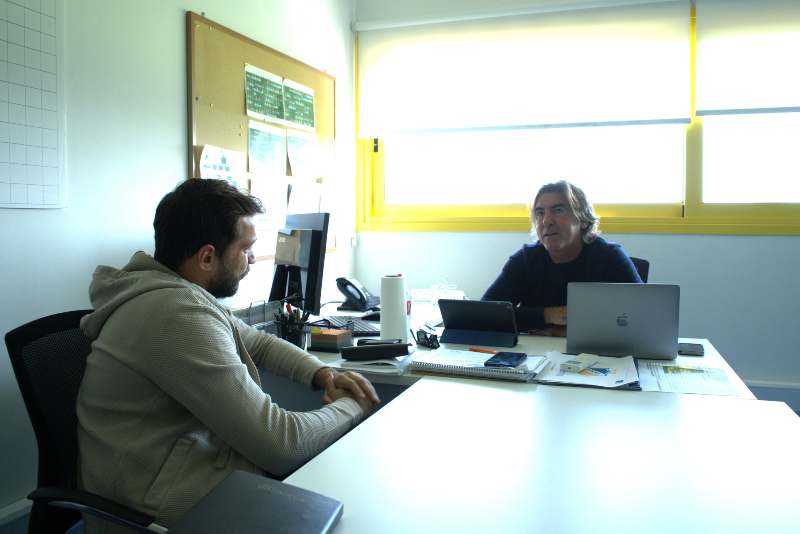Said Pinto in Gazzetta: “I regretted saying “no” to AEK, I went to sign for Panathinaikos, but…”
I wish we could go back in time. When you left Porto for Salgueiros, did you feel that you had something more than the other guys and that you wanted to take the next step?
“I felt it at the age of 8. From 14 I was a small child and suddenly I got 12 points. I was 1.55-1.60. At this age the physique makes all the difference because technique alone is not enough. Then I felt that I can go to the next level and I went and told my mother that I want to go to the first team in Salgueiros. Now there are many children who play in the first teams, but 30 years ago It’s not common.”
Do you remember your first match as a professional player? Was your mother at the stand?
“No, because it was gone and we lost. It was the second game of the season and the first for me. I went into the last quarter and we were already losing. A player playing in my place was injured so I came in. In the next match, a player was injured again and I came on as a substitute at 0-0 and we won 1-0. From the next game I was a starter and I didn’t stop playing.”
Was there a coach who was “the key” in your career?
“In the first team I had Filipovic and Mario Reis and they both believed in me and made me play. Filipovic was the coach who started to put me in and Reis, who came in the middle of the year, was the coach I played the most with and marked me in my first professional season.”
How difficult it was to stand out in a country like Portugal. You must have been something special.
“Back then, my generation was called ‘golden’. Jorge Costa, Abel Xavier, Rui Costa, Capucho, Paulo Bento, Pauletta, Bahia, Figo, Costinha, Conceição, Joao Pinto… It was a great generation. We went to the final with U21 in the final for the EC against Italy. That kit showed the Portuguese teams that they had to get the kids playing and then my generation started investing in the youngsters. It was very difficult to get 19 and 20-year-olds to play. One of the coaches who influenced me in my career and brought me to Sporting Lisbon was Carlos Queiroz. Then he took me to the national team and believed in me.”

Do you remember anything special from Carlos Queiroz? Something he told you?
“Yes, it’s a measure of training methodology in terms of fitness and technique. I did a lot of detailed work on the finishes. Wednesday we had a double, Thursday finals. We worked on speed and strength. He always had a specific schedule. He introduced tactics to football, such as developing from the back zone, taught us to read the game and gave us a different idea of football. We played 4-4-2, but we didn’t have the movements in the game, we played disorganized.”
How did you manage to stay grounded when playing for one of the biggest teams in the country at such a young age? Do you think children are losing their minds due to lack of education?
“Yes, now they start making money from the age of 14, they have agents. This started in our time from the age of 18-19. Now it’s a different generation, football brings a lot of money and kids want to be like Messi, but they don’t work as much. The competition is much tougher than it used to be. The status of the footballer is not what it was a few years ago. Now everything has changed. Science has entered football.”
Kids are looking for easy money.
“Yes, they look more at their image, but they also prepare more than the kids 30 years ago. This generation has to be more mature, the kids become stars earlier and they have to prove that things and teams have made mistakes in this case , because they give too much exposure to the young kids. 30 years ago the coach was more like a father, he wasn’t a dictator, but there was more respect. Now the players are stronger than the coaches. The teams live off these kids and not from the coaches. Every team wants to sell these players to make money.”
Don’t like your players having tattoos and putting so much importance on their image? As a coach, what do you not accept from your players?
“I have no problem with that, it is a very common situation. First of all, we have rules, the players know them, and when they don’t follow them, they pay a fine. 90% of the fines are to put some limits on them.”
But what drives you crazy?
“I don’t like players who come to training and don’t give everything, who don’t train hard. It’s unacceptable, we’re professionals. Whether you play or not, in this day and age you have to be professional, you’re bound by your contract and those are the rules. I’m the first to demand these of myself. I’m the first to go to training, I’m always there and I’m an example to everyone and try my best. These are not for negotiation.”